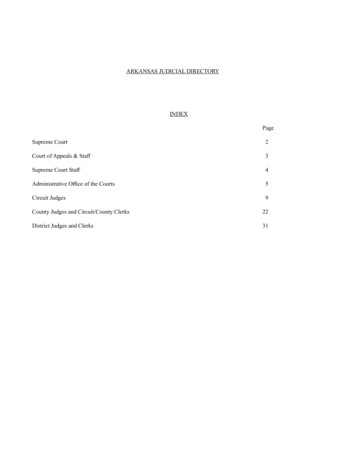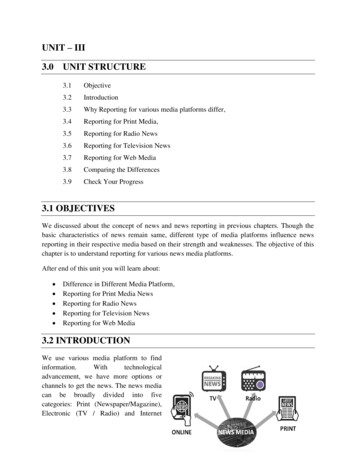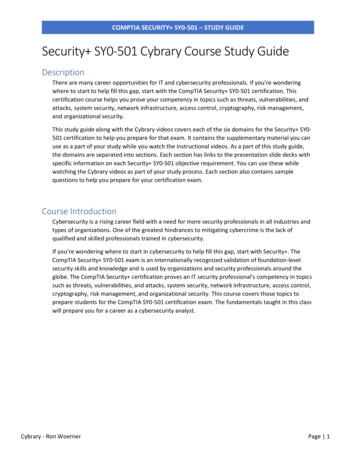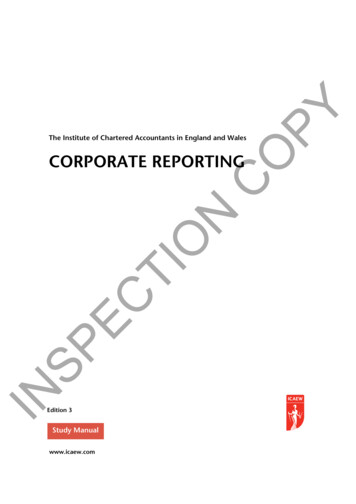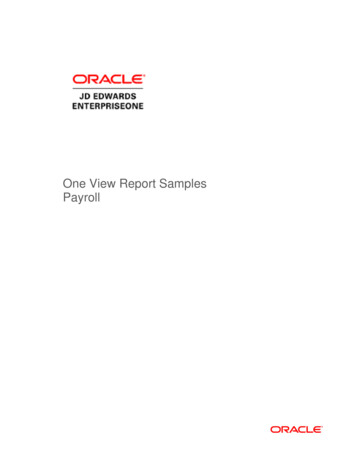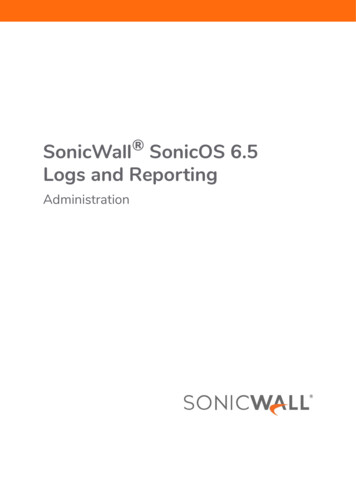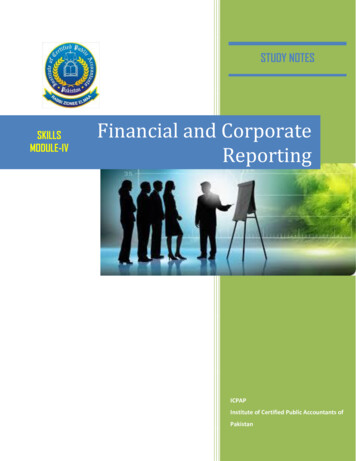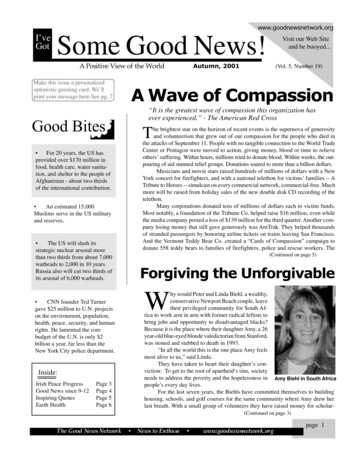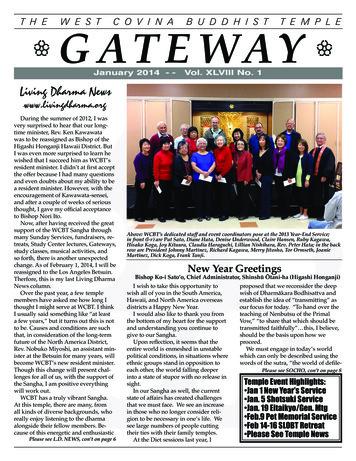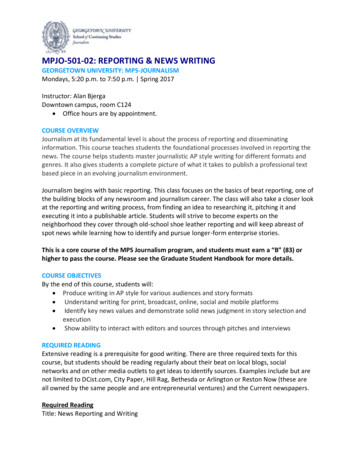
Transcription
MPJO-501-02: REPORTING & NEWS WRITINGGEORGETOWN UNIVERSITY: MPS-JOURNALISMMondays, 5:20 p.m. to 7:50 p.m. Spring 2017Instructor: Alan BjergaDowntown campus, room C124 Office hours are by appointment.COURSE OVERVIEWJournalism at its fundamental level is about the process of reporting and disseminatinginformation. This course teaches students the foundational processes involved in reporting thenews. The course helps students master journalistic AP style writing for different formats andgenres. It also gives students a complete picture of what it takes to publish a professional textbased piece in an evolving journalism environment.Journalism begins with basic reporting. This class focuses on the basics of beat reporting, one ofthe building blocks of any newsroom and journalism career. The class will also take a closer lookat the reporting and writing process, from finding an idea to researching it, pitching it andexecuting it into a publishable article. Students will strive to become experts on theneighborhood they cover through old-school shoe leather reporting and will keep abreast ofspot news while learning how to identify and pursue longer-form enterprise stories.This is a core course of the MPS Journalism program, and students must earn a “B” (83) orhigher to pass the course. Please see the Graduate Student Handbook for more details.COURSE OBJECTIVESBy the end of this course, students will: Produce writing in AP style for various audiences and story formats Understand writing for print, broadcast, online, social and mobile platforms Identify key news values and demonstrate solid news judgment in story selection andexecution Show ability to interact with editors and sources through pitches and interviewsREQUIRED READINGExtensive reading is a prerequisite for good writing. There are three required texts for thiscourse, but students should be reading regularly about their beat on local blogs, socialnetworks and on other media outlets to get ideas to identify sources. Examples include but arenot limited to DCist.com, City Paper, Hill Rag, Bethesda or Arlington or Reston Now (these areall owned by the same people and are entrepreneurial ventures) and the Current newspapers.Required ReadingTitle: News Reporting and Writing
Author: Melvin MencherISBN: 0073511994Edition: 12thPublisher: The McGraw-Hill CompaniesYear: 2010Price: 81.99 (Amazon)Title: The Associated Press Stylebook and Briefing on Media LawAuthor: Associated PressISBN: 978-0465062942Publisher: Basic BooksYear: 2015Price: 14.21 (Amazon)(Also available for free via Georgetown Library online resources)Other readings will be made available on the class Blackboard site that are not listed on thissyllabus. Students are expected to keep up with those reading assignments and to be preparedto discuss them in class.EQUIPMENTIf you do not already have a digital audio recorder, it is strongly recommended that youpurchase one for use on class assignments. You will also need a laptop to complete in-classdeadline drills and other assignments.ATTENDANCEAs outlined by the university, missing more than two classes will result in a final grade reductionof one level (for example, an A will be converted to an A-). Absences for classes beyond theinitial two will result in further reduction of the final grade. If you are absent for more than fourclasses, you will be in danger of failing this course.This class relies heavily on attendance and participation. Punctual attendance is critical. If youhave to miss a class – family emergency, medical emergency or other act of God – you must letthe instructor know in advance and work out a proposal for making up whatever work you willmiss. Exceptions will be made only in extraordinary circumstances.Finally: Please keep the morning of Saturday, April 15, open on your calendars in the unlikelyevent that a session must be rescheduled due to the instructor's absence. Class that day willmeet at the downtown campus, from 10 a.m. to 12:30 p.m.CLASSROOM ETIQUETTE
Students should turn off all cell phones, pagers or other communication devices while in class.Class discussions should be respectful and considerate of others’ views and opinions.In the event of a weather emergency (or any other widespread emergency) that closes theGeorgetown Downtown building, we will plan to meet virtually via online videoconferencingtools. More information will be provided on how this will work later in the semester.ASSIGNMENTSThe class assignments consist of a beat memo, an enterprise reporting plan, five beat stories(including written pitches for all but the broadcast-writing assignment) and regular AP newsquizzes. Five news quizzes will be given over the course of the semester, testing studentknowledge of current events. Each will account for two percent of the student's course grade.The beat stories will each follow the same process: pitch, write and optional rewrite. Each ofthe steps has a corresponding deadline. Late work will not be accepted because in the workingworld of journalism deadlines are non-negotiable. All late work will receive an initial grade of azero.Each story will be emailed to the instructor by the assigned deadline with the title of theassignment in the subject line, for example, “Government Story” or “Government StoryRewrite.”Each story must include: A headline and graphic suggestions A word count Photo or Creative Commons-licensed Flickr pic (and proper caption/credit information) A list of primary and secondary sources and phone numbers for all primary sources.These sources will on occasion be spot-checked by the instructor, so please inform allsubjects that they may receive a call from your instructor. Multiple sources (You must quote or paraphrase at least two people in each story.Saying you talked to more people and quoting only one is still a one-source story. Onesource stories will receive a zero.)Stories handed in that exceed the word count by more than 100 words — or are below theword count by 100 words or more — will automatically be given a grade reduction of one level(for example, from A to A-). The broadcast assignment should be no fewer than 125 words ormore than 150 words.For every story, students can choose to do a rewrite for a higher grade. The higher grade willreplace the grade earned on the first draft of the story.
One exception to this rule is the reporting plan for the enterprise piece. It will be updated withan outline and additional questions and sources. The grades for the first version and theupdated version will be averaged.Deadlines separate journalism from mere writing. You must meet them. All late work willreceive a grade of a zero, unless you have asked for an extension of the deadline prior to thepiece being due. Students will only be excused from deadlines due to genuine emergencies, butall reasonable effort must be made to notify the instructor ahead of time.All formal, written pitches for stories will be due at 10 a.m. on the Friday after class. All firstdrafts of stories will be due one week later, and rewrites one week after that. Note that thedeadlines for the enterprise story and its corresponding parts are exceptions. See details below:1. A beat memo about the area you cover. Due Jan. 25. No rewrite.2. A 500-word event or spot news story. Pitch due: Feb. 3. Story due: Feb. 10. Rewrite due:Feb. 17.3. A 500-word story on local politics/government (Students will be required to attend agovernment meeting pertinent to their beat for this assignment). Pitch due: Feb. 17.Story due: Feb. 24. Rewrite due: March 3. (Note: Students may arrange for alternatedeadline in order to attend a meeting.)4. A 600-word story on crime or business. (Students will be required to do a police ridealong as part of this assignment). Pitch due March 24. Story due: March 31. Rewrite due:April 7.5. A 700-word feature OR profile story. Pitch due: March 31. Story due: April 7. Rewritedue: April 21.6. A rewrite of a previous story in broadcast style: Story due: April 14. Story due: April 28.7. A 1,000-word enterprise story. This story cannot come from a press release and mustreflect a major issue that is unique to your beat. Ideas due: Feb. 17. Final pitch due:March 3. Reporting plan due: March 24. Reporting plan update and outline due: April 7.First draft due: April 21 (10 a.m.). Optional second draft due: May 5 (10 a.m.). Finalversion due: May 10 (10 a.m.).GRADINGYour course grade will be based on the following:Class participation (including pitches and news quizzes):Beat memo:Reporting plan/outline for enterprise piece:Various stories off beat:Final enterprise story:Total:20 points5 points15 points25 points (5 points each)35 points100 points
Graduate course grades include A, A-, B , B, B-, C and F. There are no grades of C , C- or D.AAB 69.99-0The instructor will provide a warning by mid-semester to any student who appears to be ontrack for a poor final grade.UNIVERSITY RESOURCESGeorgetown offers a variety of support systems for students that can be accessed on maincampus or at the downtown location: MPS Writing Resource .edu/ Academic Resource Center202-687-8354 arc@georgetown.eduhttp://ldss.georgetown.edu/ Counseling and Psychiatric DENTS WITH DISABILITIES POLICYStudents with documented disabilities have the right to specific accommodations that do notfundamentally alter the nature of the course. Students with disabilities should contact theAcademic Resource Center (202-687-8354; x.cfm) before the start of classes to allow time to review thedocumentation and make recommendations for appropriate accommodations. Ifaccommodations are recommended, you will be given a letter from ARC to share with yourprofessors. You are personally responsible for completing this process officially and in a timelymanner. Neither accommodations nor exceptions to policies can be permitted to students whohave not completed this process in advance.GEORGETOWN HONOR SYSTEMAll students are expected to maintain the highest standards of academic and personal integrityin pursuit of their education at Georgetown. Academic dishonesty in any form is a seriousoffense, and students found in violation are subject to academic penalties that include, but are
not limited to, failure of the course, termination from the program, and revocation of degreesalready conferred. All students are held to the Honor Code. The Honor Code pledge follows:In the pursuit of the high ideals and rigorous standards of academic life, I commit myself torespect and uphold the Georgetown University Honor System: To be honest in any academicendeavor, and To conduct myself honorably, as a responsible member of the Georgetowncommunity, as we live and work together.PLAGIARISMStealing someone else’s work is a terminal offense in journalism, and it will wreck your career inacademia, too. Students are expected to work with integrity and honesty in all theirassignments. The Georgetown University Honor System defines plagiarism as "the act ofpassing off as one's own the ideas or writings of another.” More guidance is available throughthe Gervase Programs at /53377.html.If you have any doubts about plagiarism, paraphrasing and the need to credit, check outhttp://www.plagiarism.org.SYLLABUS MODIFICATIONThe syllabus may change to accommodate discussion of emerging topics. Also, the schedules ofguest speakers may require some shifting of our agenda. The instructor will make every effortto provide as much advance notice as possible for any alterations.
CLASS SCHEDULEWEEK 1 (WEDNESDAY, JANUARY 11) WHAT IS NEWS? Discussion: How does a reporter find news? What makes a piece of informationnewsworthy? How do you rank different stories within a publication? Also, we will go overthe syllabus. Workshop: Students will look at a sample budget of stories, discuss what makes each of thestories on it a story and choose which ones they would run for different types ofpublications. Workshop: The class will take a short walk around Chinatown in search of story ideas.Homework due January 23: Come to class next week with your top three selections for aneighborhood beat in the D.C. metropolitan area. Write up three story ideas from your topchoice for the beat.Students must select a neighborhood in D.C., or a city/town in Maryland or Northern Virginiathat is incorporated (or has its own government) and is convenient to their home or workplace.Students should spend some time in each of the neighborhoods before selecting them, walkingaround and getting a feel for the place. They should also pick a neighborhood with issues thatinterest them. In general, predominantly residential areas in nicer neighborhoods are notrecommended as it is harder to find news in them.Reading for January 23: Components of the Story in Mencher What Is News in Mencher Digging for Information in Mencher Selection from “News is a Verb” on Blackboard Selection from “The Kingdom and the Power” on BlackboardWEEK 2 (MONDAY, JANUARY 23) BEAT ASSIGNMENTS, BRAINSTORMING AND PITCHING Guest Speaker: Megan Hunt from the Georgetown University library will discuss how touse Nexis, ProQuest and other professional tools to do research on your beat and othertopics. We will also discuss how to find local sources through social media. Discussion: What is a beat? How does a reporter find news off a beat? How do youdevelop official and unofficial sources? How do you decide what are the best stories off abeat? How do you go from idea to pitch? Workshop: Students will make pitches for their chosen beat and decide as a group whocovers what. (Instructor has the final say.) We will hold a news meeting to select storyideas from your beat.Assignments due January 27: Write a beat memo for your new neighborhood to hand in by 10
a.m. that day. The beat memo should include a list of possible story ideas for the semester.Bring in a recent news release from your beat or come ready to pitch an event.Reading for Jan. 30: Speeches, Meetings and News Conferences in Mencher Selection from “The Image,” Daniel J. Boorstin, Chapter 1: From News Gathering toNews Making, pp. 7-44, available on Blackboard.WEEK 3 (MONDAY, JANUARY 30) EXECUTING AND IDEA/THE EVENT OR SPOT STORY Discussion: The difference between spot news and enterprise news. How do reportersprepare for speeches, rallies and other planned events? Where do you look for anglesthat set your story apart? What about breaking news? What makes a good story ideaand how do you get from idea to reporting? Workshop: Students will write a short event story based on a news release in class. Workshop: We will conduct a news meeting where students will pitch their ideas forspot news stories.Assignment: Write an event or spot story. Students will need to pre-clear the event with theinstructor. Do as much reporting as you can before the next class on your spot/event piece.Bring in your reporting notes. Final event/spot story pitch due: 5 p.m. Friday, Feb. 3 Story due: 10 a.m. Friday, Feb. 10 Rewrite due: 10 a.m. Friday, Feb. 17Reading for Feb. 6: Story Structure in Mencher The Lead in Mencher George Orwell, “Politics and the English Language,” on BlackboardWEEK 4 (MONDAY, FEBRUARY 6) STRUCTURING A NEWS STORY Discussion: Now that you have all your reporting done, how do you begin to organize itinto a news story? In this class we will go over the basics of story structure working withpublished pieces of journalism. We will discuss types of ledes, nut grafs, lede quotes andhow to sift through your notes to find the nuggets to put into a story. Workshop: Outline a piece of journalism from a prominent publication and dissect itsstructure. Workshop: Bring reporting notes in for your spot/event story and work with otherstudents to begin to outline the piece and find holes.Assignment: For the next class, students will need to find recent examples of government and politicsstories on their beat and have an idea for a government story to pitch.
Reading for February 13: Local Government in Mencher The Writer’s Art in MencherWEEK 5 (MONDAY, FEBRUARY 13) LOCAL GOVERNMENT IN THE NATION’S CAPITAL Discussion: How do you cover a government meeting? Where do you look in an agendato find the potential story or stories? How can you prepare before a meeting to file abetter story quickly afterward? Discussion of recent government/politics stories off yourbeat and potential follows. Workshop: Transcript of recent city council hearing or watch archived video of citycouncil meeting and practice spotting the news in the thicket of bureaucracy. Workshop: Students will be given a series of bureaucratic terms and sentences andtranslate those into plain English.Assignments:Please file to the instructor three ideas for your enterprise piece. Initial pitch forenterprise piece: 10 a.m. Friday, Feb. 17 Final pitch due for government/politics story: 10 a.m. Friday, Feb. 17 Story due: 10 a.m. Friday, Feb 24 unless other arrangements are made Rewrite due: 10 a.m. Friday, March 3 unless other arrangements are madeReading for Feb. 27: Interviewing Principles and Interviewing Practices in Mencher Reading from “Conducting Interviews” on BlackboardWEEK 5 (MONDAY, FEBRUARY 27) THE INTERVIEW Discussion: How does a reporter get a source to open up? What are some commontricks of the trade? What is the difference between friendly and hostile interviews? Howdo you find an angle? Discussion: How do you identify ideas for follow-up stories? Deadline drill: Students will go onto the streets of Chinatown and do a 15-minuteinterview with a subject and come back, discuss it and write a short story based on it. Workshop: Backgrounding an individual. Drafting questions for an interview. Workshop: Students will be given stories in class that have generated follow-up storiesand try to identify where to go next.Assignments:Final pitch for enterprise story due March 3 Arrange for your police ride-along in your neighborhood during the week of March 13, ifyou're doing the legal assignment.
Reading for March 3: Police Reporting in Mencher Reading from “The Good Times” on BlackboardWEEK 7 (MONDAY, MARCH 13) CRIME REPORTING Discussion: How do you cover crime and legal issues? What makes some crimesnewsworthy and others not? What are the legal and ethical concerns when reporting oncrime? How do you talk to victims and suspects? Workshop: Students will write a crime story on deadline based on information from acharging document.Assignment Police ride-along this week.Reading: Business Reporting in MencherWEEK 8 (MONDAY, MARCH 20) BUSINESS REPORTING Discussion: How do you write about business at the local level? What are some commontypes of stories about local business? How do you get business sources to open up? Workshop: Practicing translation. How to get beyond process/jargon in news writingand specialized reporting.Assignments:Compose a reporting plan for your enterprise piece. The plan should list sources to beinterviewed/should be interviewed. It should list critical questions that need to be answeredand critical pieces of evidence that are needed. It should also include the central question thatthe piece is trying to answer. Reporting plan for enterprise piece due 10 a.m. Friday, March 24.Business or legal story off your beat: Final pitch due 10 a.m. Friday, March 24 Story due: 10 a.m. Friday, March 31 Rewrite due: 10 a.m. Friday, April 7Reading for March 27: “The Art and Craft of Feature Writing,” William Blundell, Chapter 4: Planning andExecution, pp. 69-93. “Writing for Story,” Jon Franklin, Chapter 4: Stalking the True Short Story, pp. 70-90 Features, Long Stories and Series in Mencher Making Sound Observations in Mencher
WEEK 9 (MONDAY, MARCH 27) THE PROFILE/FEATURE Discussion: How do you structure a profile? How do you make your readers care about aprofile subject? Which parts of their life story do you include? What are the tellingdetails that sell the story? Discussion: What makes a good feature story? Where do you find ideas for features?How can you use the power of description and observation to make your feature writingstand out? Workshop: Students will pair up to interview each other and write the introduction to ashort profile of their classmate. Workshop (time permitting): Students will have 20 to 30 minutes in Chinatown tocapture some telling detail and write up a short story.Assignments: Final feature/profile pitch due: 10 a.m. Friday, March 31 Story due: 5 p.m. Friday, April 7 Rewrite: 5 p.m. Friday, April 21 Reading for April 3:7 steps to relevance in digital journalism by Nathan ost/7-steps-relevance-digital-journalismThe transition to digital journalism: Facebook and social networks by Paul u/tutorials/digital-transformWEEK 10 (MONDAY, APRIL 3) WRITING FOR ONLINE/SOCIAL MEDIA Discussion: How do you write for online/social media? What are the tips and techniquesthat draw and sustain an audience? How do tone, length and content differ from othernews media? Workshop: Students will be given a real-world blog and told to find potential items fromother news media for it. After a class discussion about their suggestions, they will writethree brief items in the style of the blog. Workshop: Review some tweets and Facebook posts from the class to date. Whatworked? What didn’t?.Assignments:1. Rewrite of reporting plan with additional questions and preliminary outline of piece.Due: 5 p.m. Friday, April 7. (The grades for the initial reporting plan and the update willbe averaged.)Reading for April 10: Broadcast Newswriting in Mencher “Sound Reporting: The NPR Guide to Audio Journalism and Production,” Jonathan Kern,2008. Chapter 3: Writing for Broadcast, pp. 25-38.
WEEK 10a (SATURDAY, APRIL 8) POSSIBLE MAKEUP SESSIONPotential makeup day in case instructor must reschedule a session for unlikely, unforeseenreasons. Meet at downtown campus at 10 a.m.WEEK 11 (MONDAY, APRIL 10) WRITING FOR BROADCAST Discussion: What are the elements of a radio story or TV story? How do you captureambient sound, write a voice-over and prepare for a live interview? Workshop: Students will rewrite a newspaper article into a one-minute radio spot,including an introduction from the host. Workshop: Students will rewrite the top of the same story for a TV report.Assignments: Rewrite a previous assignment as a broadcast story. No more than 150 words. Story due: 10 a.m. Wednesday, April 12 Rewrite due: 10 a.m. Wednesday, April 26WEEK 12 (MONDAY, APRIL 24) ENTERPRISE REPORTING Discussion: How to go deep on a story. Weaving in statistics, data. Introduction toinvestigative tools. How to find real people to help tell your story. Interview techniquesthat result in more than just sound bites. Workshop: Students will analyze some examples of excellent enterprise pieces anddissect the different elements in them. Workshop: Present progress on enterprise stories in class and critique.Assignment: Finish first draft of enterprise story, due at 5 p.m. Friday, April 28.WEEK 13 (MONDAY, MAY 1) PEER REVIEW Students will be paired together to critique each other’s enterprise piece.Assignment: Continue working on enterprise stories and any outstanding rewrites. Can hand inoptional second draft of enterprise story at 5 p.m. Thursday, May 5. Final enterprise story dueat 5 p.m. Thursday, May 12. No exceptions.FINAL (MONDAY, May 8) MEET THE JOURNALISTS ROUNDTABLEA group of reporters and editors working in Washington will come to class for a roundtablediscussion on contemporary media issues.
Journalism begins with basic reporting. This class focuses on the basics of beat reporting, one of the building blocks of any newsroom and journalism career. The class will also take a closer look at the reporting and writing process, from finding an idea to researching it,

